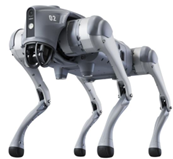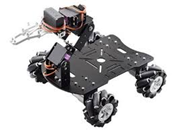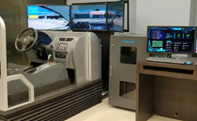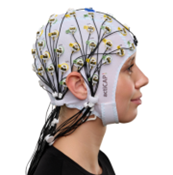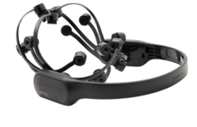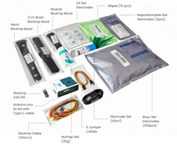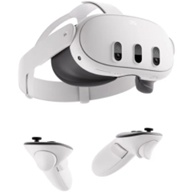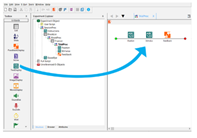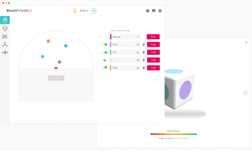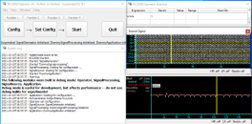The Centre for Artificial Intelligence (CAI) in MANIT, Bhopal was setup in 2019 to strengthen and support research and education within artificial intelligence, machine learning and deep learning, as well as other relevant research that supports the development of artificial intelligence applications. Centre for Artificial Intelligence intends to tackle relevant problems for the society and work as a hub for cross-sectional research in different domains such as mechanical, electrical.
India has a great potential to succeed in the forefront of AI research. Therefore, it becomes important to strengthen long-term AI-related research to utilize full potential of AI for the upliftment of the society. Centre for Artificial Intelligence at MANIT, Bhopal aims to assume the role of pivot in the field of AI in India.
To achieve excellence in the field of Artificial Intelligence, Machine Learning and Deep Learning by nurturing collaborative culture and disseminating society and industry-oriented innovations for the greater good of the society.
1. To impart value-based quality education to develop researchers and professionals who are skilled in the field of Artificial Intelligence and Machine Learning.
2. To evolve the knowledge ecosystem in the area of AI.
3. To connect and collaborate with different specializations as a hub for cross-sectional research.
4. To increase research potential in the area of AI at the Institute using high-performance computing hardware and delivered knowledge.
Centre for Artificial Intelligence aims to add value to the information by offering specialized courses in the field of AI. Specialized courses offered are designed to prepare students to build intelligent decision making machines and softwares using the knowledge imparted in the courses. Artificial Intelligence field is vast and the courses offered tries to explore the full breadth of the field along with the required depth in certain subareas and requisite programming skills. The course encompasses design theory of knowledge based systems, foundational algorithms and algorithm design theory, computer vision, programming using state-of-the-art APIs etc.
Courses offered are:
M.Tech. in Artificial Intelligence
Ph.D. in Artificial Intelligence
Faculty

Dr. Deepak Singh Tomar
Designation: Professor And HOC
Qualification: Ph.D
Research Area: Cyber Security, Machine Learning, Data Mining, Internet Technology
Email: deepaktomar[at]manit[dot]ac[dot]in,
Phone :+91-0755-4051304, +91-0755-4052645, +91-09827225851

Dr. Rajesh Wadhvani
Designation: Associate Professor
Qualification: Ph.D
Reserach Area:- Time Series Forecasting, Machine Learning
Email: rajeshwadhvani[at]manit[dot]ac[dot]in,wadhvani_rajesh[at]rediffmail[dot]com
Phone: +91-0755-4051317, +91-9893338992
More Information

Dr. Vikram Garg
Designation: Assistant Professor
Qualification: Ph.D.
Research Area: Evolutionary Algorithms, Robot Path Planning, Multi-Agent Systems and AI & Machine Learning
Email: drvikramgarg23[at]gmail[dot]com, vikram[at]manit[dot]ac[dot]in
Mobile: +91-9993415807
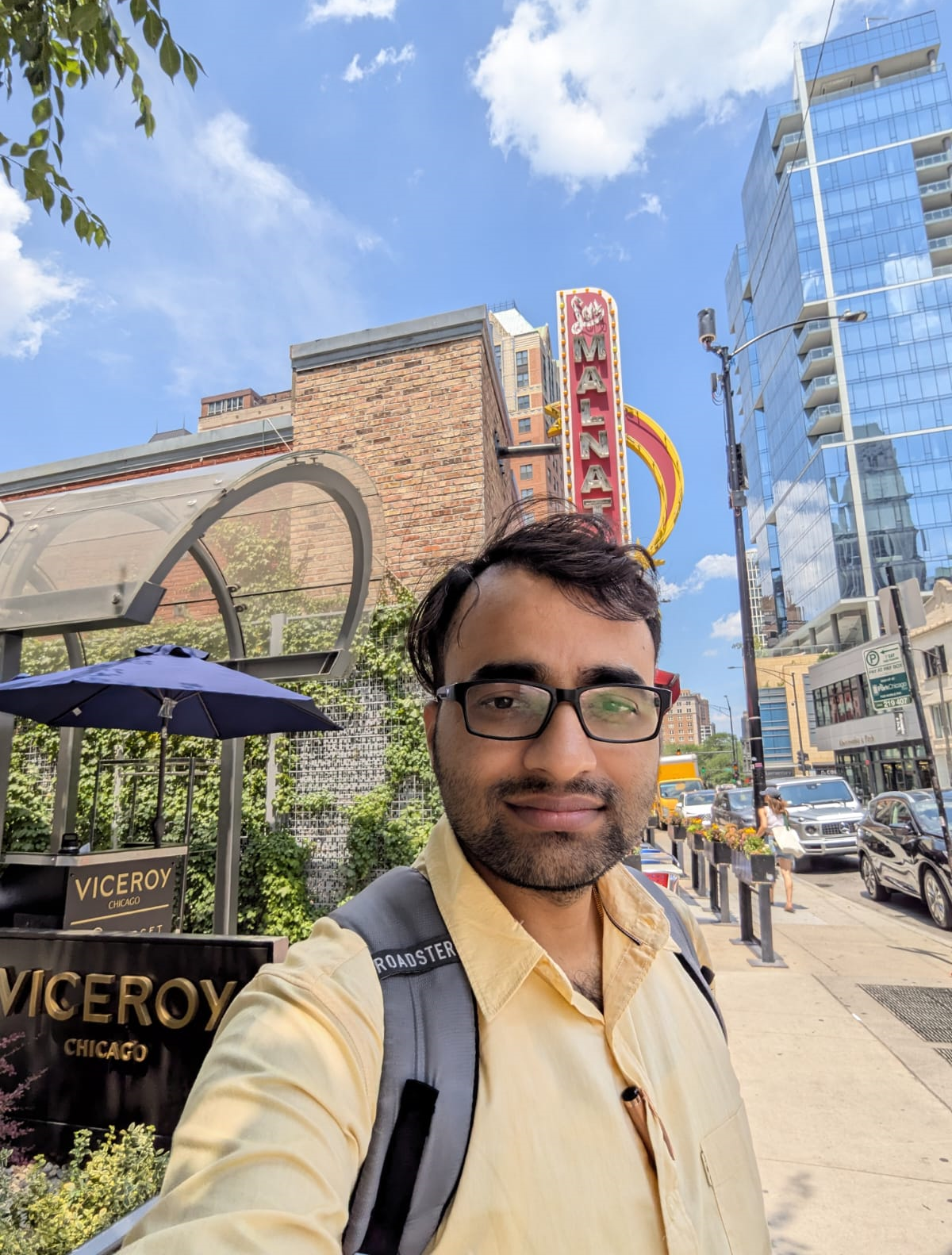
Dr. Ramesh Kumar Thakur
Designation: Assistant Professor
Qualification: Post Doc, Ph.D.
Research Area: Deep Learning, Image Processing, Machine learning, Artificial Intelligence, Robotics, Visual Cryptography, Visual Steganography
Email: ramesh.thakur2012[at]gmail[dot]com, tramesh[at]manit[dot]ac[dot]in
Mobile: +91-8340333155
Area : The Centre offers the following research area for M. Tech. and Ph.D. students
Machine Learning/ Artificial Intelligence
|
Faculty Name |
Research Activities |
|---|---|
|
Dr. Ashish Kumar Sahu |
Brain Computer Interface, Emotion Recognition, Human Activity Recognition, Real World Classification problems
|
|
Dr. Mitul Kumar Ahirwal |
|
|
Dr. Meenu Chawla |
|
|
Dr. Sri Khetwat Saritha |
|
|
Dr. Sanyam Shukla |
|
|
Dr. Vikram Garg |
Image Processing and Information Retrieval
|
Faculty Name |
Research Activities |
|---|---|
|
Dr. R. K.Pateriya |
Semantic Web, Ontology Target Entity Disambiguation, Sentiment Analysis, Emotion Analysis, Topic Modeling |
|
Dr. Sri Khetwat Saritha |
|
|
Dr. Jyot iBharti |
|
|
Dr. Rajesh Wadhvani
|
|
|
Dr. Deepak Singh Tomar
|
|
|
Dr. Jaytrilok Choudhary
|
|
|
Dr. Ashish Kumar Sahu
|
Big Data Analytics
|
Faculty Name |
Research Activities |
|---|---|
|
Dr. Meenu Chawla |
Data Capturing and Storage, Machine learning algorithms for Big data, Hadoop, Spark, Hive ,NOSQL, Map Reduce, Storm |
|
Dr. Nilay Khare |
|
|
Dr. R K Pateriya |
|
|
Dr. Akhtar Rasook |
|
|
Dr. Dhirendra Pratap Singh |
|
|
Dr. Jaytrilok Choudhary |
|
|
Dr. Deepak Singh Tomar |
|
|
Dr. Mansi Gyanchandani |
|
|
Dr. Pragati Agrawal |
|
|
Dr. Vikram Garg |
Intelligent Systems Design Lab
1. Introduction
The Intelligent Systems Design Laboratory (ISDL) at the Center of Artificial Intelligence, MANIT Bhopal is dedicated to fostering research, innovation, and education in the design and development of intelligent computational systems capable of perception, reasoning, learning, and autonomous decision-making.
The laboratory serves as a multidisciplinary research and learning environment where Artificial Intelligence, Machine Learning, Computer Vision, Natural Language Processing, and Robotics converge to solve real-world challenges. It provides a dynamic ecosystem for students, researchers, and faculty to design, simulate, and deploy intelligent agents and cognitive systems across diverse domains.
3. Laboratory Overview
- Lab Name: Intelligent Systems Design Laboratory
- Founded: 2025
- Coordinator: Dr. Vikram Garg
- Primary Focus Areas:
- Intelligent Agent Architectures and Multi-Agent Systems
- Knowledge Representation and Reasoning
- Planning and Decision-Making Systems
- Deep Reinforcement Learning and Adaptive Control
- Human - AI Collaboration and Cognitive Computing
- Explainable and Trustworthy AI
- AI for Autonomous Systems and Smart Environments
- Location: Center of Artificial Intelligence, MANIT Bhopal, Madhya Pradesh, 462003, India
4. Personnel
4.1. Faculty Coordinator
- Dr. Vikram Garg
- Position: Assistant Professor, Center of AI
- Qualifications: Ph.D. in Robotics
- Research Interests: Evolutionary Algorithms, Robot Path Planning, Multi-Agent Systems and AI & Machine Learning
4.2. Affiliated Faculty
- Dr. Vikram Garg (Coordinator)

4.3. Current Ph.D. Scholars
- Mr. Vijay Pawar (Area: Robotics)
4.4. Current M.Tech Students
- Mr. Karamvir Singh
- Mr. Bibin Saju Joseph
- Mr. Digvijay Singh
- Ms. D. Shruti
- Ms. Amrita
- Mr. Vatsalya
- Mr. Pratham
5. Infrastructure & Facilities
Our lab is equipped with:
|
Sl No |
Equipment Name |
|
1 |
Robot engineering Learning Kits |
|
2 |
Autonomous Driving Vehicles Solar Power |
|
3 |
Sensor kit (Ultrasonic Sensor, light Sensor, Distance, Force, Touch etc ) |
|
4 |
Swarm Miniature Drone Robots and Setup |
|
5 |
Articulator Robot Arm
|
|
6 |
Differential Mobile Robot |
|
7 |
Drone Simulator |
|
8 |
AI+IoT Builder Workstation |
|
9 |
High end Desktop 14th Gen or higher |
6. Research and Publications
6.1. Selected Publications
- Tiwari, P, Khetwat, S & Garg, V. (2025). An Analysis of Explainable Transformer Models to Improve Question Answering for Depression Detection. ICCCNT-2025.
- Joseph, B & Garg, V. (2025). Comparative Evaluation of YOLOv8 Variants on Aerial Object Detection with DOTAv1.5. REACS-2025 (Accepted).
6.2. Patents
- Title: Smart Back Support Belt (Published)
- Description: AI based smart back support belt for preventing Musculoskeletal injuries.
- Application No.: [461694-001]
7. Collaborative Environment
The Intelligent Systems Design Lab operates as a collaborative platform that connects:
- Students - working on innovative AI projects and theses.
- Faculty and Researchers - exploring advanced models for learning and reasoning.
- Industry Partners - integrating intelligent automation into real-world systems.
- Funding Agencies - supporting mission-driven research in national AI initiatives.
8. Contact Information
- Address: Intelligent Systems Design Laboratory, Center of Artificial Intelligence, MANIT Bhopal, Bhopal, Madhya Pradesh 462003, India
- Email: vikram@manit.ac.in
- Phone: +91-9993415807
Computer Vision Lab
Center of Artificial Intelligence, MANIT Bhopal
1. Introduction
The Computer Vision Laboratory at the Center of Artificial Intelligence (CAI), MANIT Bhopal, is a state-of-the-art research and learning facility dedicated to exploring the intersection of visual perception, artificial intelligence, and machine learning. The lab focuses on empowering computers to interpret, analyze, and understand visual information from the world, much like human vision.
This laboratory serves as a core hub for research, innovation, and education in image processing, pattern recognition, 3D vision, and deep learning-based visual intelligence. It enables students, scholars, and faculty to design and deploy real-world vision systems for applications in autonomous systems, medical imaging, surveillance, augmented reality (AR), virtual reality (VR), and robotics.
2. Vision & Mission
- Vision: To establish the Computer Vision Laboratory as a national center of excellence in visual computing and intelligent perception systems, driving impactful research and innovation for society.
- Mission:
- To design and develop AI-driven computer vision systems capable of human-like understanding of images and videos.
- To provide a platform for research, experimentation, and innovation in visual data analysis.
- To integrate deep learning and computer vision into real-world problem-solving domains such as healthcare, industry, and transportation.
- To nurture skilled professionals and researchers through hands-on learning and interdisciplinary collaboration.
- To design and develop AI-driven computer vision systems capable of human-like understanding of images and videos.
3. Laboratory Overview
- Lab Name: Computer Vision Laboratory
- Founded: 2025
- Coordinator: Dr. Ramesh Kumar Thakur
- Primary Focus Areas:
- Image and Video Processing
- Object Detection, Recognition, and Tracking
- Image Restoration and Enhancement (Denoising, Super-Resolution)
- Semantic and Instance Segmentation
- 3D Vision and Depth Estimation
- Facial Recognition and Emotion Analysis
- Vision for Robotics and Autonomous Systems
- Augmented, Virtual, and Mixed Reality (AR/VR/MR)
- Medical Image Analysis and Remote Sensing
- Location: Center of Artificial Intelligence, MANIT Bhopal, Madhya Pradesh, 462003, India
4. Personnel
4.1. Faculty Coordinator
- Dr. Ramesh Kumar Thakur
- Position: Assistant Professor, Center of AI
- Qualifications: PostDoc(Northwestern University, USA), Ph.D (IIT Patna)
- Research Interests: Deep Learning, Image Processing, Machine learning, Artificial Intelligence, Robotics, Visual Cryptography, Visual Steganography
4.2. Affiliated Faculty
- Dr. Ramesh Kumar Thakur (Coordinator)

4.3. Current Ph.D. Scholars
- Ms. Tanveer Fateema Khan (Area: Image Processing)
4.4. Current M.Tech Students
- Mr. Shashank Gupta
- Mr. Nikhil Gupta
- Mr. Anuj Kumar Singh
- Mr. Alfahad Ansari
- Ms. Shraddha Gupta
5. Infrastructure & Facilities
Our lab is equipped with:
|
Sl No |
Equipment Name |
|
1 |
Thermal Sensors / Thermal Cameras |
|
2 |
3D LiDAR Sensor |
|
3 |
Depth Cameras |
|
4 |
Mixed Reality Device |
|
5 |
AR Device (Android) |
|
6 |
360° Camera with tripod stand |
|
7 |
XR Device: 256GB with link cable |
|
8 |
Audio System: 4.1 Channel Multimedia Speaker System |
|
9 |
Advanced VR Device: (512GB) with link cable & carry case |
|
10 |
VR Ready Workstation |
|
11 |
High-Resolution Camera Systems (Computer Vision Input)Resolution : 8 MP to 50+ MP |
|
12 |
Haptics Device |
|
13 |
Hyper Spectral Camera |
|
14 |
Fingerprint Scanner |
|
15 |
IRIS Scanner |
6. Research and Publications
6.1. Selected Publications
- Gupta, S, Thakur, R.K, & Gyanchandani, M. (2025). Enhancing Diffusion-Based Image Restoration with Per-Timestep Edge Guidance. ICMLDE-2025 (Accepted).
6.2. Patents
- Title: Smart Back Support Belt (Published)
- Description: AI based smart back support belt for preventing Musculoskeletal injuries.
- Application No.: [461694-001]
7. Collaborative Environment
The Computer Vision Lab actively encourages collaboration:
- Student Projects and Research: B.Tech, M.Tech, and Ph.D. scholars conduct innovative projects in visual AI.
- Industry and Academic Partnerships: Collaborative research with national and international organizations.
- Workshops and Hackathons: Hands-on training sessions on Computer Vision and Deep Learning.
- Publications and Funding: Research outcomes published in reputed AI and vision journals and conferences.
8. Contact Information
- Address: Computer Vision Laboratory, Center of Artificial Intelligence, MANIT Bhopal, Bhopal, Madhya Pradesh 462003, India
- Email: tramesh@manit.ac.in
- Phone: +91-8340333155
IoT & Health-IoT Laboratory
Department of Computer Science & Engineering, MANIT Bhopal
1. Introduction
The Internet of Things (IoT) & Health-IoT Laboratory, established in 2022 within the Department of Computer Science & Engineering at Maulana Azad National Institute of Technology (MANIT), Bhopal, is a dedicated research facility. The lab's mission is to advance research and education in the fields of embedded sensing systems, signal processing, machine learning for sensor data, healthcare informatics, robotics, and human-activity recognition.
The laboratory provides a dynamic environment for undergraduate, postgraduate, and Ph.D. students to pursue cutting-edge research. We are committed to building end-to-end prototypes, from initial sensing and data acquisition to machine learning inference and final deployment. Our work is strengthened by robust collaborations with industry partners and clinical institutions.
2. Laboratory Overview
- Lab Name: Internet of Things & Health-IoT Laboratory
- Founded: 2022
- Coordinator: Dr. Vijay Bhaskar Semwal
- Primary Focus Areas:
- Internet of Things (IoT)
- Wearable & Flexible Sensors
- Edge AI & Computing
- Human Activity Recognition (HAR)
- Biomedical Signal Processing
- Location: Department of Computer Science & Engineering, MANIT Bhopal, Madhya Pradesh, 462003, India
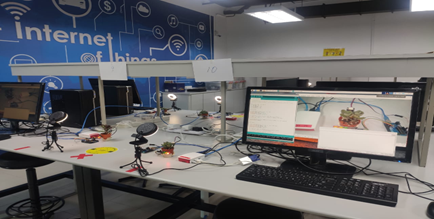
3. Personnel
3.1. Faculty Coordinator

- Dr. Vijay Bhaskar Semwal
- Position: Assistant Professor, Department of CSE
- Qualifications: Ph.D. in Robotics & AI
- Research Interests: IoT, Wearable/IMU sensors, Human-Activity Recognition, Gait Analysis, Edge Computing, and Healthcare AI.
3.2. Affiliated Faculty
- Dr. Vijay Bhaskar Semwal (Coordinator)
.3. Graduated Ph.D. Scholars
- Dr. Rahul Jain
- Dr. Anjali Gupta
- Dr. Pratibha Tokas
3.4. Current Ph.D. Scholars
- Mr. Pranay Yadav
- Mr. Swapnil MURAL
- Mr. Hemant Kumar (Area: Robotics)
3.5. Current M.Tech Students
- Mr. Krishna Kumar Burman
- Ms. Namrata Singh
- Mr. Satyam Singh
- Mr. Rishi Raj
- Mr. Sai Chakri
- Mr. Anirudh Khade
- Mr. Furqan Khan
4. Laboratory Equipment
|
Devices |
Item / Model |
About |
Image |
|
Fitness or Exercise machine |
Treadmill |
A treadmill is an exercise machine that allows a person to walk, jog, or run indoors on a moving belt. |
|
|
Quadruped robot |
GO 2 Unitree |
The Go2 Unitree robot is a quadruped robotic dog designed for mobility, AI interaction, and versatile applications. |
|
|
Biomechanical sensor system |
Force plate |
It is a measuring device that detects ground reaction forces generated by a body standing, walking, or jumping on it. |
|
|
Wearable EEG |
wearable sensing revolutionizing EEG DSI |
It is a wireless, dry-electrode EEG headset that records brain activity for research, clinical, and neurotechnology applications. |
|
|
Humanoid education/research |
Nao6 robot |
This is a humanoid robot developed by SoftBank Robotics, designed for education, research, and human-robot interaction with advanced sensors and AI capabilities. |
|
|
Prototyping |
3D Printer |
A 3D printer is a machine that creates three-dimensional objects by adding material layer by layer based on a digital model. |
|
|
Wearable brain computer interface |
EEG-E motive |
EEG Emotiv is a wearable neurotechnology device that records brain activity through electroencephalography for research, gaming, and cognitive applications. |
|
|
Rehabilitation equipment |
Exercise Stationary cycle |
An exercise stationary cycle is a fitness machine that simulates cycling indoors to improve cardiovascular health, endurance, and leg strength. |
|
|
Mobile Manipulator |
Mecanum wheel robot with robotic arm |
A mecanum wheel robot is a mobile robot equipped with special omni-directional wheels that allow it to move in any direction without changing its orientation. |
|
5. Research and Publications
5.1. Selected Publications
- Semwal, V. B., & Doe, A. (2025). Human Activity Recognition using GRU and Transformer Models. Journal of IoT Systems.
- Semwal, V. B., & Roe, B. (2024). Gait Trajectory Estimation with Minimal IMUs. IEEE SensorApps.
- Semwal, V. B., et al. (2023). Edge Computing for Health-IoT. IEEE Internet of Things Journal.
- Semwal, V. B., et al. (2023). Pattern identification of different human joints for different human walking styles using inertial measurement unit (IMU) sensor. Springer.
- Semwal, V. B., et al. (2023). Robust and accurate feature selection for humanoid push recovery and classification: deep learning approach. Springer.
- Semwal, V. B., et al. (2023). An optimized hybrid deep learning model using ensemble learning approach for human walking activities recognition. Springer.
- Semwal, V. B., et al. (2023). Biometric gait identification based on a multilayer perceptron. Elsevier Internet of Things Journal.
5.2. Patents (Filed)
- Title: Wearable System for Real-Time Gait Monitoring
- Description: A lightweight, low-power IMU-based system for continuous gait analysis and fall risk assessment.
- Application No.: [XXXX/DEL/20YY]
- Title: IoT-Enabled Remote Health Diagnostics Platform
- Description: A platform for secure data acquisition and edge inference for telehealth applications.
- Application No.: [YYYY/MUM/20ZZ]
6. Product Designs & Prototypes
- Treadmill Integration: System to track belt speed for pace calculation.
- Mecanum Wheel Robot: Prototypes utilizing Raspberry Pi, Arduino, and Jetson Nano.
- GO 2 Unitree Dog Robot: Development leveraging its high-performance CPU and AI accelerator.
- Force Plate Analysis: Software for analyzing high-precision 3D force and moment data.
- Virtual Reality Headset: Systems utilizing head movement tracking.
- Nao6 Robot Interaction: Programming for natural interaction leveraging its 25 DOF and sensor suite.
- 3D Printed Prototypes: Custom parts and models created directly from CAD files.
7. Contact Information
- Address: IoT & Health-IoT Laboratory Department of Computer Science & Engineering, MANIT Bhopal, Bhopal, Madhya Pradesh 462003, India
- Email: vbsemwal@manit.ac.in
- Phone: +91-7541805885
Brain-Computer Interface Laboratory
Department of Computer Science & Engineering, MANIT Bhopal
1. Introduction
The Brain-Computer Interface (BCI) Laboratory, established in 2024 at the Maulana Azad National Institute of Technology (MANIT), Bhopal, is a specialized research center dedicated to advancing brain-machine interaction through the use of Electroencephalography (EEG) signals.
The lab's primary focus is to develop direct communication pathways between the human brain and external devices. It serves as a hub for research in EEG signal analysis, cognitive neuroscience, and human-computer interaction. Through the use of advanced equipment and AI-driven signal processing techniques, the lab supports a wide range of applications in assistive technologies, healthcare, and neurofeedback. We provide an environment that fosters hands-on training and innovation for undergraduate, postgraduate, and Ph.D. researchers.
2. Laboratory Overview
- Lab Name: Brain-Computer Interface Laboratory (BCI Lab)
- Established: 2024
- Lab In-Charge: Dr. Mitul Kumar Ahirwal
- Research Focus:
- Emotion Recognition
- Mental Workload Analysis
- Motor Imagery
- Cognitive Neuroscience1
- Location: Second Floor, B-Block, Department of Computer Science and Engineering, MANIT Bhopal, Madhya Pradesh 462003, India
3. Lab In-Charge

Dr. Mitul Kumar Ahirwal
Position: Associate Professor, Department of Computer Science and Engineering
4. Laboratory Equipment & Software
4.1. Hardware
|
Category |
Item / Model |
Description |
Image |
|---|---|---|---|
|
Simulation |
TecknoSIM Car Driving Simulator |
An advanced simulator for training drivers in realistic scenarios. |
|
|
EEG Acquisition |
LiveAmp 32-channel EEG |
A wireless EEG amplifier for mobile EEG applications. |
|
|
EEG Acquisition |
EPOC+ 14-channel Wireless EEG |
A wireless EEG headset for mobile EEG applications. |
|
|
Physiological Sensing |
EmotiBit |
A wearable sensor module for capturing emotional, physiological, and movement data. |
|
|
Neuroscience Kit |
Neuor Kit (DIY) |
Includes the BioAmp EXG Pill for recording various biopotential signals (EEG, ECG, EMG, EOG). |
|
|
Response Collection |
Chronos Response Device |
Enables millisecond-accurate response collection, voice recording, and external device synchronization. |
|
|
Virtual Reality |
Meta Quest 3 |
A next-generation mixed reality headset for immersive research, training, and interactive applications. |
|
4.2. Software
|
Name |
Description |
Image |
|
Brain Vision Recorder |
Multifunctional EEG recording software for versatile and easy-to-use recording setup and execution. |
|
|
E-Prime |
A platform for designing, running, and analyzing behavioral experiments with millisecond-precise timing. |
|
|
EmotivPRO |
Advanced EEG recording software designed for researchers and developers, focusing on precision and adaptability. |
|
|
Emotiv BCI |
Converts brain activity, facial expressions, and head movements into digital signals to control devices and applications. |
|
|
OpenViBE |
A software platform to design, test, and use Brain-Computer Interfaces (BCIs) and for generic EEG processing. |
|
|
BCI2000 |
An open-source, general-purpose software system for BCI research, including tools for data acquisition, processing, and device interaction. |
|
5. Publications
- Jain, S., Ahirwal, M. K., Kumar, A., Bajaj, V., & Singh, G. K. (2016).2 QRS detection using adaptive filters: A comparative study. ISA Transactions (Elsevier).3
- Ahirwal, M. K., Kumar, A., & Singh, G. K. (2014).4 Adaptive filtering of EEG/ERP through noise cancellers using an improved PSO algorithm.5 Swarm and Evolutionary Computation.
- Ahirwal, M. K., Kumar, A., & Singh, G. K. (2012).6 Analysis and testing of PSO variants through application in EEG/ERP adaptive filtering approach.7 Biomedical Engineering Letters.
- Sahu, M. L., Atulkar, M., & Ahirwal, M. K. (2021).8 IoT-enabled cloud-based real-time remote ECG monitoring system.9 Journal of medical engineering & technology.
- Pal, H. S., Kumar, A., Vishwakarma, A., & Ahirwal, M. K. (2022).10 Electrocardiogram signal compression using tunable-Q wavelet transform and meta-heuristic optimization techniques. Biomedical Signal Processing and Control.
6. Contact Information
- Address:
Brain-Computer Interface Laboratory (BCI Lab)
Second Floor, B-Block
Department of Computer Science and Engineering, MANIT Bhopal,
Bhopal, Madhya Pradesh 462003, India11 - Email: mkahirwal@manit.ac.in12
- Contact No.: +91-9981216927
- Website:- https://sites.google.com/view/mitulkumarahirwal/bci-lab

